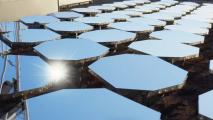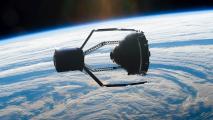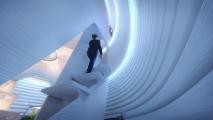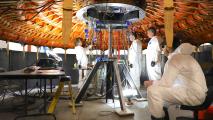Showing 562 results
NASA needs people to pretend they’re living on Mars
To prepare for a future in which astronauts are living on Mars, NASA is looking for people willing to live in a simulated Mars habitat.
The 2021 Disney Accelerator sheds light on Disney’s metaverse ambitions
From AI to AR to live video shopping: these are the 8 companies selected for the Disney’s yearly accelerator program.
DeepMind’s virtual playground suggests path to general AI
DeepMind’s virtual playground, XLand, could help create general AI by overcoming the problem of insufficient training data.
Toyota’s autonomous shuttle is optimized for Olympians
Tokyo Olympians are riding around the Olympic Village in Toyota’s e-Palette, an autonomous shuttle designed with their needs in mind.
Autonomous boat maps seafloor from San Francisco to Hawaii without a human crew
The Saildrone Surveyor could change how we understand the ocean.
Is the US military testing an anti-aging pill?
The U.S. military is developing an anti-aging pill that is designed to inhibit performance reduction that comes with aging.
Rarely seen glass octopus caught on film
An underwater robot has recorded stunning footage of a glass octopus, an almost completely transparent cephalopod rarely caught on film.
TV shows train AI to predict human behavior
Algorithms are learning to guess what you'll do next by analyzing shows like "The Office."
New CRISPR tech could help us create superior crops of the future
A new CRISPR technology that focuses on gene activation rather than deactivation could help us create the superior crops of the future.
New search and rescue drone listens for human screams
To help first responders find people during disasters, researchers are training a search and rescue drone to listen for human screams.
Flying race car zips across the sky for the first time
The world’s first flying race car, the Airspeeder Mk3, has completed its maiden flight and is on track to compete in a first-of-its-kind racing series later in 2021.
E. coli turns plastic waste into vanillin
Scientists have engineered E. coli bacteria to convert plastic waste into vanillin, an in-demand compound used in vanilla flavoring and more.
The augmented, virtual, human-machine future of surgery is here
Advancements in XR technologies are rapidly integrating into the future of surgery.
Surgeons can now practice on a 3D-printed copy of your liver
A new technique for creating life-like 3D-printed livers based on individual patients’ scans could help surgeons be better prepared for operations.
How lasers will create ‘uncrashable’ cars
Luminar is using lidar to build smarter and safer autonomous vehicles.
Series|
Hard Reset
How mirrors could power the planet… and prevent wars
If adopted globally, concentrated solar power could make major waves in manufacturing, not to mention prevent wars over oil and mitigate climate change.
McDonald’s is replacing human drive-thru attendants with AI
McDonald's just rolled out a voice recognition system at 10 drive-thrus in Chicago.
Can AI negotiate? Walmart is betting on it
AI startup Pactum is trying to save big companies millions with AI negotiation.
The world’s deepest pool will host astronaut training in the UK
U.K. company Blue Abyss has submitted plans to build a massive aquatic facility in Cornwall, England, and its centerpiece will be the world’s deepest pool.
Japan’s transforming moon rover gets help from toy company
Japan is sending a transforming moon rover to the lunar surface in 2022 to collect data that will inform an upcoming crewed mission.
Gecko gripper could clean up space junk
The Earth is circled by a sea of space junk, and it poses a danger to satellites and astronauts. We know we should...
New lab-grown mini hearts have a human-like beat
Researchers created the first human mini heart in the lab. The mini hearts, called cardioids, have developed distinctly beating chambers, which fire in sync.
Will human augmentation move too fast for our brains?
To show how human augmentation can affect the brain, participants in a new study underwent fMRIs after learning to use a prosthetic called the "Third Thumb."
Liverpool and DeepMind are bringing AI to the beautiful game
AI in sports has taken off in recent years. Now, Liverpool and DeepMind are teaming up to see how AI may impact the world’s most popular sport.
CRISPR could save billions of baby chicks before they hatch
Male chicks are killed as soon as they hatch, in a gruesome process called chick culling. Gene editing could save them.
AI dubbing can make actors appear to speak any language
A new AI dubbing tech called TrueSync matches actors’ mouths with recorded dialogue to make watching a movie in an unknown language feel less jarring.
How wonky cell phone signals help track wildfire smoke
An atmospheric oddity called a temperature inversion helped researchers discover how mobile phone signals could show the amount of bushfire smoke suffocating towns and cities.
The world’s first fully electric, self-driving tractor
Monarch Tractor’s all-electric, self-driving tractor could save farmers money, while also benefiting the environment.
Series|
Just Might Work
Catching the most dangerous thing in space
More than 8,000 tons of space debris orbit Earth, endangering our astronauts and satellites. Can we clean up space before it’s too late?
You can now live forever. (Your AI-powered twin, that is).
Mind Bank Ai wants to create a “personal digital twin” of you to forever be around. Is AI eternity around the corner?
Stanford’s ankle exoskeleton lets you walk 40% faster
An ankle exoskeleton that significantly increases self-selected walking speed could make it easier for older people to get around.
FDA authorizes mind-controlled exoskeleton for stroke rehab
Neurolutions’ IpsiHand — a brain-computer interface that uses an exoskeleton to assist with stroke rehab — has been authorized by the FDA.
Tech dump is finding a place for ex-offenders
Electronic waste is the fastest-growing garbage stream in the world. This nonprofit is counting on it to give formerly incarcerated people a head start.
Bat-inspired sound location tech could allow drones to fly solo
Inspired by bat’s ears, researchers at Virginia Tech have created a device capable of pinpointing sound location more accurately than other tech — or our ears.
Scientists may have found the secret to invisibility
Researchers have developed a unique light wave that, when beamed through an object, makes the object appear invisible to cameras and even the human eye. This could be the key to invisibility.
Will the next space station be made of fabric?
NASA is considering an inflatable space habitat designed by Sierra Nevada Corporation as a potential space station of the future.
The next generation of living machines: xenobots 2.0
Made from the stem cells of a frog, “Xenobots” are tiny living machines. And researchers have just debuted version 2.0.
Space bacteria could help astronauts grow plants on Mars
A brand new species of bacteria has been discovered on the International Space Station — and it could one day help astronauts grow plants on Mars.
Wireless brain-computer interface moves out of the lab
A new wireless brain-computer interface was able to record and transmit brain signals as effectively as the “gold standard” wired systems.
An IBM quantum computer is being built at a US hospital
An IBM quantum computer is being installed at the Cleveland Clinic as part of the organizations' Discovery Accelerator collaboration.
It's now possible to diagnose concussions with saliva
Saliva was used to diagnose concussions with 94% accuracy, suggesting that an objective concussion test may finally be within reach.
The golden box that could create oxygen on Mars
MOXIE, an instrument designed to create oxygen on Mars from carbon dioxide, is now ready for testing on the Red Planet.
AI backpack “sees” for visually impaired people
An AI backpack powered by Intel technology “sees” for visually impaired people, letting them know about any potential obstacles in their path.
This startup can make a digital twin of anyone
In just a few minutes, Hour One can produce a digital twin of anyone, capturing their likeness, expressions, and voice.
Researchers have developed a “plant communication” device
Plants emit weak electric signals. Researchers have developed a device to read and send signals back — a type of “plant communication.”
Underwater gliders could soon run off of the ocean’s changing temperatures
California company Seatrec wants to bring their temperature-harnessing generator technology to underwater gliders.
NASA’s Mars helicopter phoned home. Here’s what’s next.
NASA’s Mars helicopter Ingenuity has survived the journey to the Red Planet. Here’s what’s next for the first-of-its-kind aircraft.
Building infrastructure on Mars is tricky — these bugs could help
Landing on Mars is just the beginning — to live there, we'll need to invent Martian concrete.
Nike unveils its first hands-free sneaker: The GO FlyEase
The GO FlyEase is Nike’s first completely hands-free sneaker — and the design was inspired by a letter from a teenage boy with cerebral palsy.
This ice cream is made from lab-grown vegan milk
Disappointed by available milk alternatives, the startup Perfect Day developed lab-grown vegan milk that’s molecularly identical to the kind from cows.
We're floating in 6,000 tons of junk
There's a lot of trash in outer space. We need to clean it up before it becomes unusable.
Bots can now swim like a school of real fish
Bluebots, robotic fish developed at Harvard, are the first to demonstrate complex swarm behaviors underwater.
Autonomous trucks are taking to the highways
Self-driving cars get all the love, but autonomous trucks are already hitting the road, with a “driver-out” demonstration scheduled for 2021.
Nerve-stimulator helps people walk after MS and strokes
The EvoWalk wearable uses electrical stimulation, sensors, and AI to combat foot drop, a condition commonly linked to MS and strokes.
This spider-like moon rover will explore lunar lava tubes
A spider-like moon rover heading to the lunar surface in 2021 is designed to explore the underground lava tubes in which astronauts might one day live.
Wind turbine blades are a growing waste problem
Using decommissioned wind turbine blades to build bridges, buildings, and more could eliminate one of the biggest disadvantages of wind energy.
The most anticipated space missions of 2021
The list of 2021's most exciting space missions includes several Mars orbiters, a couple of moon shots, and the launch of an asteroid-deflecting spacecraft.
ESA is building its first reusable spaceplane
ESA is officially building Space Rider, a spaceplane designed to give scientists cheaper access to microgravity for their experiments.
This may be the 3D-printed submarine of the future
Using unique construction techniques, this 3D-printed submarine may set the pace for the building of large AUVs to come.
New optical sensor imitates the human eye
Researchers have created an optical sensor, designed to mimic the human eye. The team says this is a major breakthrough in neuromorphic computing
This VR exoskeleton lets you actually run through virtual worlds
A VR exoskeleton called the Holotron works with a person’s entire lower body to let them control the locomotion of an avatar in VR.
How to protect our future (when AI gets too smart)
The future of AI looks promising, but it doesn’t come without risks. How can we keep the technology in check, before it outsmarts us?
A massive iceberg is about to crash into an island of penguins
A massive iceberg is expected to hit South Georgia Island. To assess the impact of the collision, researchers are deploying a pair of robot submarines.
Heads up display lets firefighters see through smoke
Qwake Technologies’ C-Thru is a heads up display that combines AI, augmented reality, and thermal imaging to help firefighters battle blazes.
AI navigation system teaches itself to steer internet balloons
Loon is using a new AI navigation system trained via reinforcement learning to control its fleet of internet-beaming balloons in Kenya.
We can grow 60% more food by hacking photosynthesis
By improving photosynthesis, we can get more food from our farmland.
The plan to convert space debris into labs for astronauts
Space services company Nanoracks plans to convert space debris into orbiting “Outposts” that could serve as hotels, research parks, and more.
Scientists found a coral reef bigger than a skyscraper, hidden in plain sight
Researchers used an underwater robot to explore a new coral reef near Australia. The coral reef is the first reef discovery in 120 years.
A French company is building the world’s biggest insect factory farm
Ÿnsect is building the world’s largest insect farming facility in Amiens, France. The mealworms grown there may end up feeding your pets and the salmon on your plate.
Autonomous boats could move people and goods
MIT launches a new autonomous boat — a fleet of floating platforms that could come together to build bridges, taxi people across a river, or create a party platform.
The "Iron Man" of beetles could inspire super-durable cars and planes
The diabolical ironclad beetle could be the next big thing in biomimicry, inspiring the design of extra-durable planes, cars, and more.
Nokia is building a 4G network on the moon
As part of NASA's "Tipping Point" program, Nokia will establish a 4G network on the moon to help astronauts communicate with each other and Earth.
Waymo's driverless car service opens to the public
Waymo One has relaunched, and this time, all users can ride in cars without safety drivers.
The coronavirus can survive on surfaces for 28 days
The coronavirus can survive on surfaces, including money, for up to 28 days. But does that change what you need to do to avoid catching COVID-19?
Disinfecting drones to spray stadium after NFL games
Are the disinfecting drones set to fly over Mercedes-Benz Stadium after Atlanta Falcons games useful or just another example of hygiene theater?
Undescribed deep sea creatures discovered in the great barrier reef
Researchers discovered undescribed deep sea creatures, spotted rare fish, and gathered geological samples from the deepest part of the Great Barrier Reef.
Can we turn the moon into a gas station?
NASA is looking to buy moon rocks from private companies. This lunar marketplace will spur the development of new technologies that can extract resources from the moon.
New brain implant reads minds from inside a blood vessel
A first-of-its-kind neural interface called the Stentrode sits in a blood vessel in the brain, picking up signals it can wirelessly transmit to a computer.
The world's first living machines
The world's first living robots may one day clean up our oceans.
You can now order a 3D printed, mind-controlled prosthetic arm
By scanning amputees’ limbs with a 3D scanner, Unlimited Tomorrow is making custom prosthetic arms that can be controlled with the mind.
Pocket-sized bot can perform surgery better than humans
A tiny origami-inspired robot assists surgeons in a mock surgery.
Elon Musk: Neuralink brain implant detects pigs' movements
During a livestream, CEO Elon Musk presented the latest Neuralink brain implant, as well as what he claimed were several pig recipients of the device.
Exploring Earth’s final frontier with AUV technology
NASA engineers are using swarms of underwater drones to learn about our most important and least understood natural resource.
How to radically biohack your mind
Brain-computer interfaces could enable humans to "merge with AI."
Smart farm equipment can spot weeds among crops
Facebook’s facial recognition AI will turn ordinary farm equipment into precision agriculture machines by training it to spot the weeds among the crops.
Scientists grow mini human hearts from stem cells
Mini human hearts grown from stem cells, also known as "heart organoids," could help doctors address the most common kind of birth defect in humans.
The material that could help humans become cyborgs
Coating implantable electronics in the polymer PEDOT can extend their life, which could make cyborgs more common in the future.
How to mass produce your own organs
Bioprinting could be the next frontier of personalized medicine.
A sunblock to save Martian explorers from radiation in space
Radiation in space is a major threat to astronauts’ health, but a new biomaterial could make space exploration a little less dangerous by blocking x-rays.
Japan automates construction with the first bot-built dam
A Japanese construction company has robots taking over jobs that are understaffed, due to a labor shortage.
Human-like "organ chips" could eliminate animal studies
To rapidly test for COVID-19 treatments without animal studies, researchers make a model human body out of “organ chips.”
Meet NASA's autonomous vehicle — for Mars
When Perseverance lands on Mars, it will hopefully drive further faster than any rover before. NASA’s autonomous vehicle’s secret? A dedicated “pilot.”
Preparing for the first human mission to Mars
Mars is going to be bombarded with visitors from planet Earth — the U.S., China, and UAE are all launching unmanned spacecraft to the red planet this month.
The most impressive language generator yet
OpenAI’s GPT-3 is currently the talk of Twitter. The powerful language generator is writing everything from sci-fi to code.
The world's first floating 3D printed house
A group in the Czech Republic is using a 3D printing robot to construct what it claims will be the world’s first floating 3D printed house.
5 must-reads on American police reform
In our weekly roundup, we take you inside the fight to reform America’s criminal justice system, exploring potential solutions to this complex problem.
How organoids are helping scientists fight the coronavirus
Researchers are turning to organoids — lab-grown clumps of cells that mimic human organs — in an effort to better understand the coronavirus.
Exploring the ocean floor with autonomous underwater vehicles
Efficient, autonomous, and economical, the AUV is quickly becoming essential for underwater research.
A new way to find people lost at sea
In a search and rescue mission at sea, time is of the essence. A new model may make missions faster — and save lives.



































































































